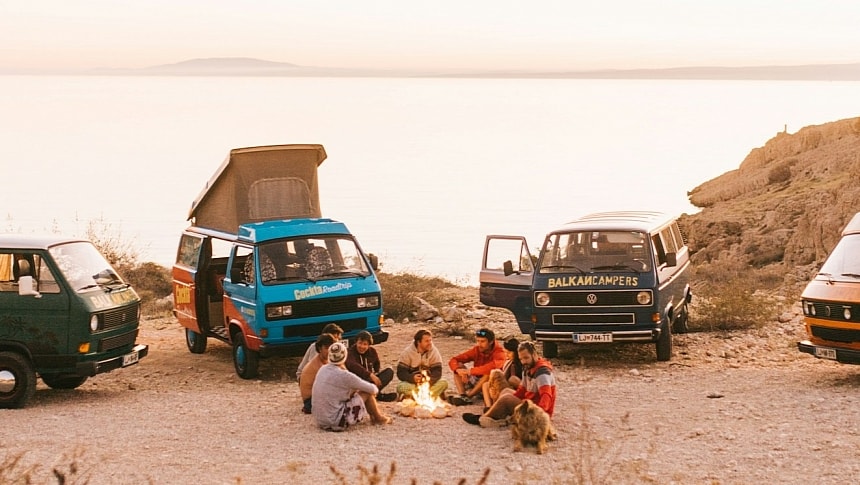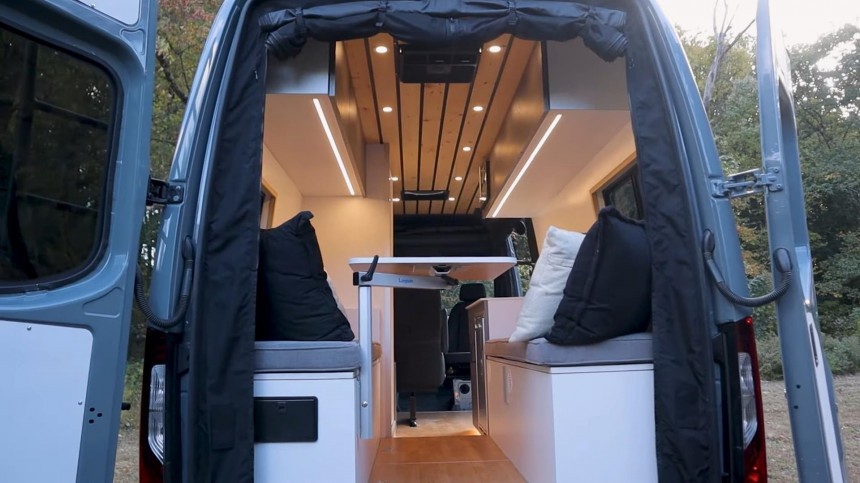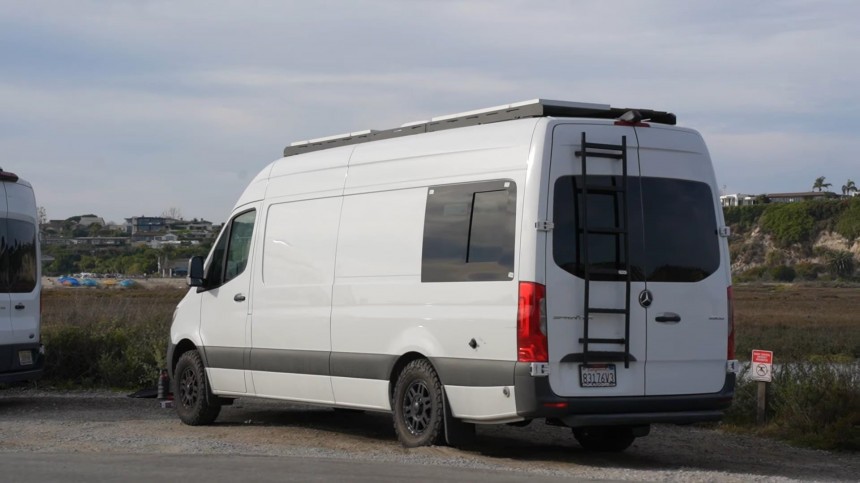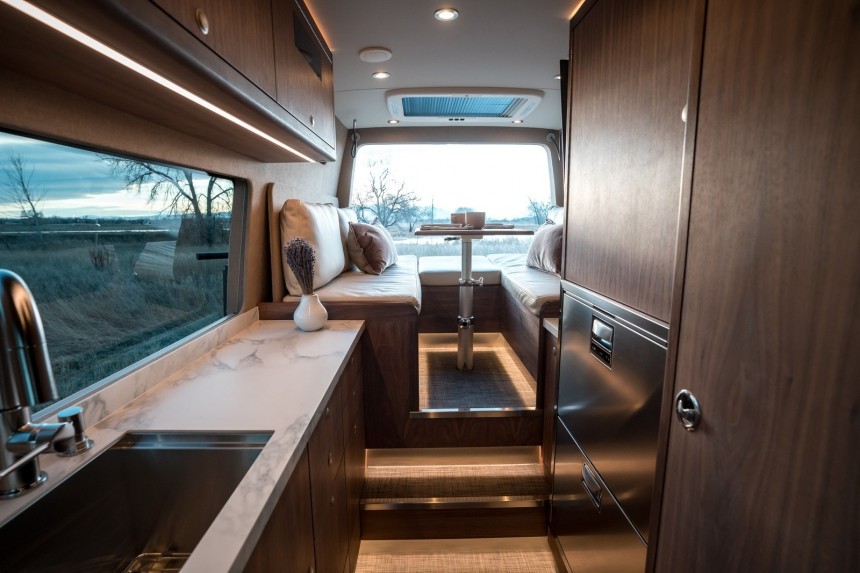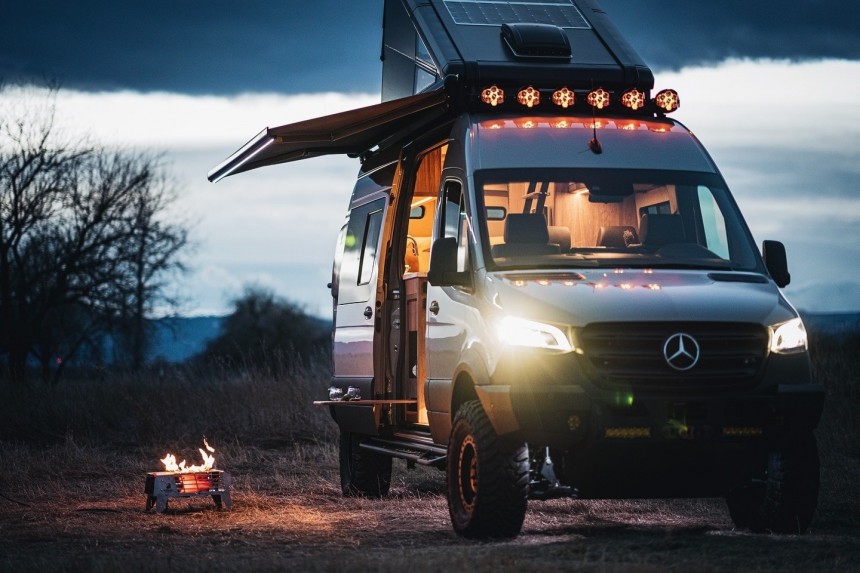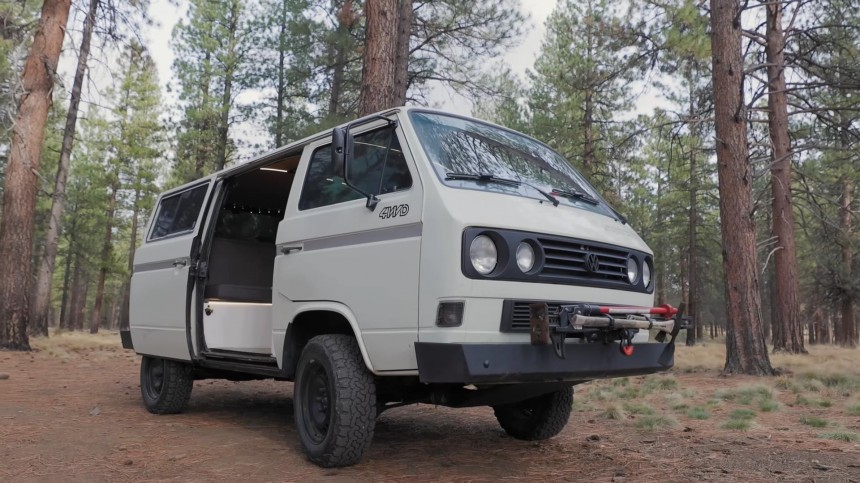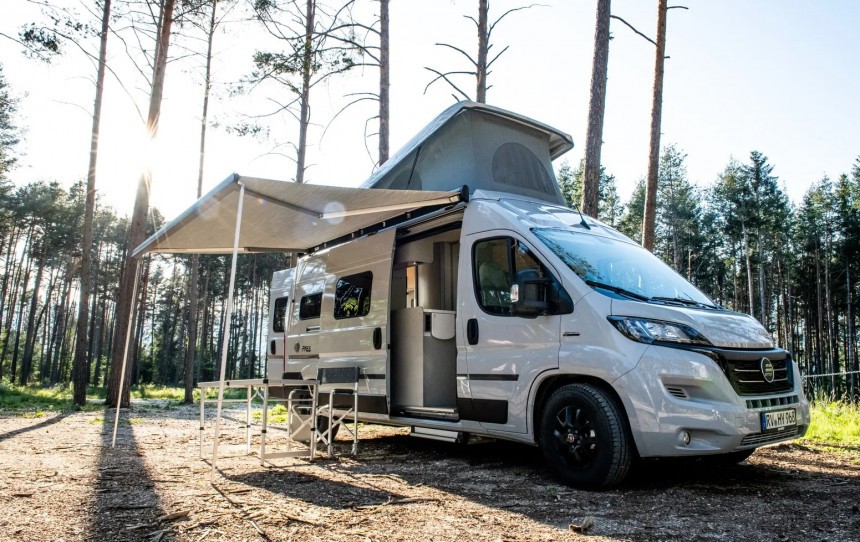So you're thinking of buying a camper van since you're here reading this article. Or, at least, you'd like to learn more about the topic. There are many things to consider when you start the journey of buying a camper van. Even if this isn't your first time purchasing one, you'll surely find some helpful tips and tricks – there's always more to learn.
Some people might hesitate to buy a camper van since it's quite a significant investment - this article is meant to help guide you through the decision.
You're probably now in the research phase, scouring through dozens of articles and videos to find out all you can about camper vans. Research is always good, but you might overload your brain with information at some point.
My point is this: do your research but also start making a game plan. In the next part of this article, I will discuss the questions you need to ask yourself (and answer) before you take the first steps of getting your hands on a camper van. There are many things to determine, but I'll try to talk about the crucial questions – some might seem obvious, but I'll still list them.
To be clear, these questions are relevant to buying a new or used camper van directly or converting one by yourself or through a specialized conversion company.
What type of van you go for will significantly depend on what you'll use it for – the answer to this question will directly impact your other answers.
Some people want day trips, while others want to spend several days onboard. Or, you could choose the full-on experience and live and travel in a camper van for extended periods, maybe even taking it abroad.
Suppose you're going to use it for day or weekend trips. In that case, you should focus on having a lot of storage space instead of fitting utility systems like plumbing and electrical systems, which can be useful when traveling for extended periods.
If you want a camper van to travel by yourself or with a friend/partner, having enough room won't be an issue. But things can get a little more complicated once you add another adult or kids in the mix.
That being said, there's a solution for almost everything. Most medium and large camper vans come with two sleeping spots. Moreover, if you plan on making a DIY conversion, you should be able to build extra sleeping spaces. There's always the option of adding a pop-top roof or a roof tent.
Try to make a realistic plan – of course, you'll probably want to take your family with you on adventures, but how often will that happen? If it's just over a year, and the rest of the time you'll be traveling alone or with your partner, it's not worth buying a massive van for a one-off vacation.
The best way to figure this out is by creating a list of all the essentials you require in a camper van.
The "essentials" will significantly vary from one adventurer to another. You might be surprised by the features some camper vans come with. However, it's important you don't get lost among all the luxury features – or, if you do, make sure you've ticked all of your necessities.
For the sake of this article, I'll make a short list of what I consider essentials on camper vans. Of course, as I said, these vary depending on who you ask, but this list might help you narrow down some of your necessities:
Based on the essentials you require and how you like to travel, meaning how many clothes you need, accessories, gadgets, etc., you should be able to estimate how much storage you need.
Storage won't be an issue if you go on a weekend solo camping trip or with a friend or partner. But if you need a camper van for a family adventure, even a shorter trip will require extra storage space.
You can also equip various accessories on the roof and at the rear to store some of your stuff, leaving more room inside.
A well-designed camper van will offer more storage space than meets the eye. Moreover, you can do your part by using space-saving organization hacks or bringing space-saving tools and gear, such as collapsible cookware.
A 4x4, 4WD, or AWD camper van will cost you more than a 2WD one. However, they open up many new exploration opportunities and enable you to escape the hustle and bustle of urban areas without worrying about getting stuck.
Heading off the beaten path also means you might wear down your camper faster. Of course, wear and tear will happen nonetheless – that's something you have to consider, as the time will come to service or fix various mechanical issues. And that's besides the routine maintenance you'll have to carry out.
Regarding going off-grid, you'll need to invest in various systems, such as electrical and plumbing. Batteries are a must to power all the appliances, and so are food storage options and water tanks if you plan on spending multiple days away from civilization. Generally, the more space you'll have, the easier it will be to go off-grid, both regarding comfort and how much room you have to fit equipment.
If your budget is on the lower side, you might want to consider a DIY Conversion – they're much cheaper than buying a camper van directly or having a company convert a van for you. However, you'll have to pay with lots of your time and energy, and you'll also need some technical skills or invest some extra time to learn how to do a conversion.
The budget isn't limited to upfront costs – if only it were that easy. Make sure to account for the many investments you'll have to make down the road. Here are the main points to consider: insurance, refueling, servicing, repairs, maintenance, equipment or add-ons, interest payments (if applicable), storage, and parking.
By planning ahead, you can take your time and view various camper vans for sale. Moreover, you can even research some van converters and dealerships in your area. Alternatively, you can look at second-hand listings if you want to head down that route. And that brings me to my next question.
Another key point is that insurance for a used camper van is much lower than that of a newer one – this relates to what I just mentioned above, as its value quickly drops when it starts aging.
On the other hand, the selection of used camper vans is typically much smaller than the new camper vans for sale. This increases the chance of you having to compromise by not getting exactly what you envisioned with a new van.
Of course, there's also the risk of running into various existing issues that previous owners may not have disclosed – heck, they might not have known about some themselves. Many used camper vans haven't been looked after properly. They can come with many hidden horrors that might show up after you've embarked on your mobile living adventure, essentially ruining it. This is why it's critical to know precisely what you're buying.
It's wise to have some cash set aside upon purchasing a used camper van to fix any problems that may pop up. What's more, it helps if you have some technical skills to deal with the problems (at least the minor ones) yourself, especially if they arise when you're traveling.
Another useful tip is to bring someone with expertise if you don't yet know your way around camper vans, especially when buying from individuals. When purchasing a rig from a dealership or a van conversion company, you might get a guarantee, and the chance of being ripped off is slim to none.
If you buy a rig from a third-party website, you often don't get any protection. Although these sites will try their best to protect you, they cannot guarantee the quality of what you're buying.
You know the saying, "If something is too good to be true, then it isn't." Always keep that in mind when shopping for a used camper van.
Brand-new camper vans come with warranties, which cover them in case anything fails in the first few years of ownership or before a particular distance is driven, whichever comes first.
One of the greatest perks of new rigs is that you don't have to worry about any hidden issues or kinks with the rig.
However, it isn't all sunshine and rainbows with new camper vans (except maybe if you're swimming in money). A high cost is the biggest downside of purchasing new – if you want to use the rig occasionally or only seasonally, paying exorbitant amounts often doesn't make sense.
As I mentioned earlier, brand-new camper vans will depreciate very fast. If you want to sell the van after owning it for just a year or two, you'll likely take quite a loss. So, make sure what you buy properly fulfills your needs (at least for several years) so you don't feel the urge to upgrade in the near future. Lastly, if you want to buy new, be prepared to support the additional insurance costs.
At the end of the day, you're making an investment in your future, one that will bring you lots of enjoyment and memory-making. Consider your wants and needs, make an informed decision, and stick to it.
One great tip is to don't go all-in at first, but rather start by renting a camper van. Who knows, maybe you'll discover that van life isn't right for you, but rather something that sounded good on paper. Or, it might make you even more determined to buy a camper van. In the latter case, it will help you narrow down your exact wants and needs.
You're probably now in the research phase, scouring through dozens of articles and videos to find out all you can about camper vans. Research is always good, but you might overload your brain with information at some point.
My point is this: do your research but also start making a game plan. In the next part of this article, I will discuss the questions you need to ask yourself (and answer) before you take the first steps of getting your hands on a camper van. There are many things to determine, but I'll try to talk about the crucial questions – some might seem obvious, but I'll still list them.
To be clear, these questions are relevant to buying a new or used camper van directly or converting one by yourself or through a specialized conversion company.
1. What's the purpose of the camper van? What will you use it for?
Some people want day trips, while others want to spend several days onboard. Or, you could choose the full-on experience and live and travel in a camper van for extended periods, maybe even taking it abroad.
Suppose you're going to use it for day or weekend trips. In that case, you should focus on having a lot of storage space instead of fitting utility systems like plumbing and electrical systems, which can be useful when traveling for extended periods.
2. What size/type do you need?
Camper vans come in various shapes and sizes. I won't get into detail here - check out an article I wrote recently about the five camper van types and sizes and their pros and cons.3. Who is it for? / How many people will travel in it?
Answering this question will help you figure out how many beds you need, as well as how many seats.If you want a camper van to travel by yourself or with a friend/partner, having enough room won't be an issue. But things can get a little more complicated once you add another adult or kids in the mix.
Try to make a realistic plan – of course, you'll probably want to take your family with you on adventures, but how often will that happen? If it's just over a year, and the rest of the time you'll be traveling alone or with your partner, it's not worth buying a massive van for a one-off vacation.
4. How often will you use it?
Needless to say, the more time you spend inside your camper, the more critical it becomes to have as many creature comforts as possible. You don't need to go wild with it, especially if you don't have an unlimited budget, but you'll need stuff that makes staying in a camper van as comfortable as staying in a conventional home.The best way to figure this out is by creating a list of all the essentials you require in a camper van.
5. What are your essentials?
For the sake of this article, I'll make a short list of what I consider essentials on camper vans. Of course, as I said, these vary depending on who you ask, but this list might help you narrow down some of your necessities:
- Bed/Convertible couch
- Kitchenette/Cooking facilities – a refrigerator and a stove are the bare minimum
- Travel seats – having at least four will make things easy when you want to have guests over
- A table
- Water tanks
- Heating and cooling systems
- Utility systems: electrical and plumbing
- A toilet – most people don't want to travel without some sort of toilet facility
6. How much storage do you need?
As a rule of thumb, the more storage you have, the better off you are. There's also the concept of too much storage - although it generally never hurts to have extra storage spots, you don't want to opt for a camper van that is too big and end up not using its space to the full extent. You could end up paying more for space you don't need. Also, bigger means more fuel consumption and less maneuverability. I'm not saying, "Don't get a large camper van" - just make sure you get the appropriate size for your needs.Based on the essentials you require and how you like to travel, meaning how many clothes you need, accessories, gadgets, etc., you should be able to estimate how much storage you need.
Storage won't be an issue if you go on a weekend solo camping trip or with a friend or partner. But if you need a camper van for a family adventure, even a shorter trip will require extra storage space.
You can also equip various accessories on the roof and at the rear to store some of your stuff, leaving more room inside.
A well-designed camper van will offer more storage space than meets the eye. Moreover, you can do your part by using space-saving organization hacks or bringing space-saving tools and gear, such as collapsible cookware.
7. Where do you plan on traveling? / Do you want the rig to be off-road and off-grid-capable?
If you're looking to get a camper van, there's a very high chance you want to do it to explore the outdoors. But how deep do you want to go? If you want to go into the heart of the wilderness, consider making your rig off-road and off-grid-capable.A 4x4, 4WD, or AWD camper van will cost you more than a 2WD one. However, they open up many new exploration opportunities and enable you to escape the hustle and bustle of urban areas without worrying about getting stuck.
Regarding going off-grid, you'll need to invest in various systems, such as electrical and plumbing. Batteries are a must to power all the appliances, and so are food storage options and water tanks if you plan on spending multiple days away from civilization. Generally, the more space you'll have, the easier it will be to go off-grid, both regarding comfort and how much room you have to fit equipment.
8. What's your budget?
If the questions above didn't help you narrow down on an ideal camper van (although I highly doubt that), this one will. If you have a high budget, the sky's the limit: you can buy a luxury camper van or have a specialized company build your dream tiny home on wheels.If your budget is on the lower side, you might want to consider a DIY Conversion – they're much cheaper than buying a camper van directly or having a company convert a van for you. However, you'll have to pay with lots of your time and energy, and you'll also need some technical skills or invest some extra time to learn how to do a conversion.
The budget isn't limited to upfront costs – if only it were that easy. Make sure to account for the many investments you'll have to make down the road. Here are the main points to consider: insurance, refueling, servicing, repairs, maintenance, equipment or add-ons, interest payments (if applicable), storage, and parking.
9. When do you need it?
Typically, when we want something, we want it as soon as possible. If you need a camper van immediately, your options are narrowed down to whatever vehicles you'll find nearby. My advice is to start looking for a rig more than six months before you need it.By planning ahead, you can take your time and view various camper vans for sale. Moreover, you can even research some van converters and dealerships in your area. Alternatively, you can look at second-hand listings if you want to head down that route. And that brings me to my next question.
10. Should you buy new or used?
This question has probably crossed your mind. Needless to say, there isn't a correct answer – it all depends on your needs or, more importantly, your budget.Pros and cons of buying a used camper van
The most significant advantage of buying a used camper ban is that you might come across a fantastic deal. Camper vans quickly depreciate once they come off the assembly line. For instance, a camper van with just a few thousand miles and perhaps a few years of age can be offered for a fraction of the cost of a brand-new one.Another key point is that insurance for a used camper van is much lower than that of a newer one – this relates to what I just mentioned above, as its value quickly drops when it starts aging.
On the other hand, the selection of used camper vans is typically much smaller than the new camper vans for sale. This increases the chance of you having to compromise by not getting exactly what you envisioned with a new van.
Of course, there's also the risk of running into various existing issues that previous owners may not have disclosed – heck, they might not have known about some themselves. Many used camper vans haven't been looked after properly. They can come with many hidden horrors that might show up after you've embarked on your mobile living adventure, essentially ruining it. This is why it's critical to know precisely what you're buying.
Another useful tip is to bring someone with expertise if you don't yet know your way around camper vans, especially when buying from individuals. When purchasing a rig from a dealership or a van conversion company, you might get a guarantee, and the chance of being ripped off is slim to none.
If you buy a rig from a third-party website, you often don't get any protection. Although these sites will try their best to protect you, they cannot guarantee the quality of what you're buying.
You know the saying, "If something is too good to be true, then it isn't." Always keep that in mind when shopping for a used camper van.
Pros and cons of buying a new camper
New camper vans generally provide the latest and most remarkable features for mobile camping. If it's your first time buying a camper van, it will be easier to customize everything and fulfill all your wants and needs.Brand-new camper vans come with warranties, which cover them in case anything fails in the first few years of ownership or before a particular distance is driven, whichever comes first.
One of the greatest perks of new rigs is that you don't have to worry about any hidden issues or kinks with the rig.
However, it isn't all sunshine and rainbows with new camper vans (except maybe if you're swimming in money). A high cost is the biggest downside of purchasing new – if you want to use the rig occasionally or only seasonally, paying exorbitant amounts often doesn't make sense.
At the end of the day, you're making an investment in your future, one that will bring you lots of enjoyment and memory-making. Consider your wants and needs, make an informed decision, and stick to it.
One great tip is to don't go all-in at first, but rather start by renting a camper van. Who knows, maybe you'll discover that van life isn't right for you, but rather something that sounded good on paper. Or, it might make you even more determined to buy a camper van. In the latter case, it will help you narrow down your exact wants and needs.
